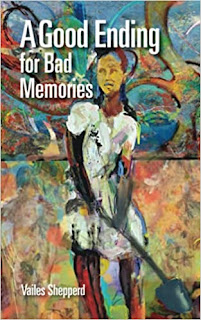Vailes Shepperd is the author of the new novel A Good Ending for Bad Memories. She is a founding member of the Washington Independent Review of Books, and she lives in Washington, D.C.
Q: What inspired you to write A Good Ending for Bad Memories?
A: Honestly, lots of things inspired this book and because it was written over a long period of time, my inspiration changed.
I believe that our fiction can reflect our truest selves. The African American narrative in American literature is not as broad as its reality. I knew from my own family’s history that there were and are many unexplored variations. Then a little Mark Twain snuck into the picture, and the story took on its own new and different directions.
And too, Elizabeth Cobb, author of The Tubman Command, said that sometimes one must fictionalize the space between one truth and another (I’m paraphrasing but this is what I took to be the gist)
The characters in this story have suffered, acted, reacted, and finally try healing.
Q: How was the book's title chosen, and what does it signify for you?
A: The title comes from me wondering what to do with memories we don’t know what to do with.
For some odd reason, I am acquainted with too many adults who spend far too much time within the confines of their mythical childhoods. And I say mythical because often enough these memories, the principal ingredients of all bad childhoods, are flawed from the very beginning.
Even more startling is that we tend to cling far more fiercely to the untruths that coalesce within, as Grace Cavalieri mentions below, our psychoses.
My conclusion is that freedom from bad memories might be best for everyone. This in no way suggests bad childhoods don’t exist, but rather that our distillation of these memories can and should be carefully considered and properly settled.
Q: The poet Grace Cavalieri said of the book, "Shepperd threads folklore, fairy tale, legend and myth, while entering the interior psychosis of 'character.'" What do you think of that description?
A: I love Grace. She is a most amazing writer/poet capable of so much beauty. The fact that she wrote about my book is simply wonderful.
The only thing she left out was “truth.” There is truth in this story. Some of it probably seems fantastical. For me, that’s the beauty and purpose of writing, stringing the truth right along with the fiction.
Q: What do you hope readers take away from the story?
A: First, I hope readers will simply enjoy reading the story. I hope it’s like nothing they’ve ever read before and that they can’t help but finish the book and at the same time, wish it would never end. And then, I hope that they clamor for the next book!
In a teaching mode, I’d say several different narratives belong in the American Literary Canon. Our lives may not be entirely represented but should be and, if we are smart, will be.
Q: What are you working on now?
A: I’m so happy you asked. I’m finishing a book entitled A Dr. Frankenstein in Eden, another family saga, but this one is about a conjoined rather than a natural family. Two women and their inept husbands and children flee the big city and take up residence in a tiny rural town attempting to become modern-day homesteaders.
Q: Anything else we should know?
A: Homesteading looks a lot easier than it is. I can’t imagine anything better than telling stories!
--Interview with Deborah Kalb


No comments:
Post a Comment